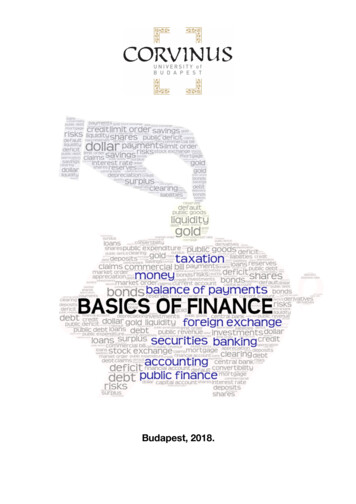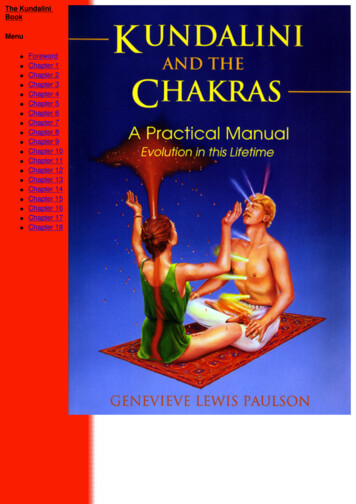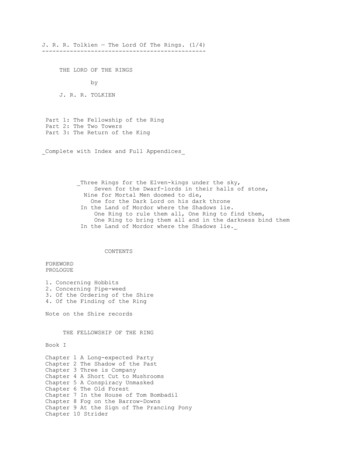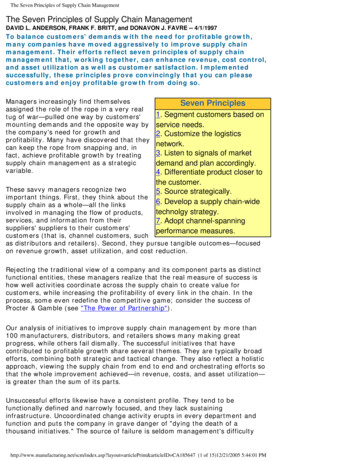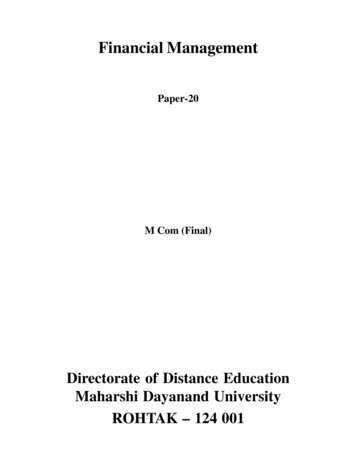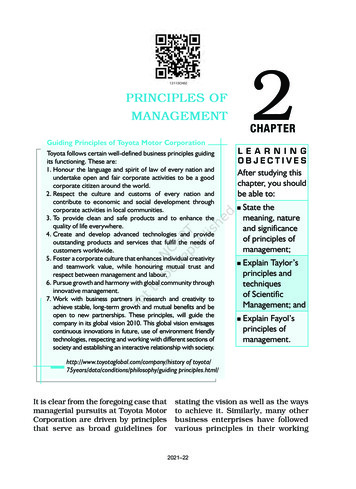
Transcription
2PRINCIPLES OFMANAGEMENTGuiding Principles of Toyota Motor CorporationToyota follows certain well-defined business principles guidingits functioning. These are:1. Honour the language and spirit of law of every nation andundertake open and fair corporate activities to be a goodcorporate citizen around the world.2. Respect the culture and customs of every nation andcontribute to economic and social development throughcorporate activities in local communities.3. To provide clean and safe products and to enhance thequality of life everywhere.4. Create and develop advanced technologies and provideoutstanding products and services that fulfil the needs ofcustomers worldwide.5. Foster a corporate culture that enhances individual creativityand teamwork value, while honouring mutual trust andrespect between management and labour.6. Pursue growth and harmony with global community throughinnovative management.7. Work with business partners in research and creativity toachieve stable, long-term growth and mutual benefits and beopen to new partnerships. These principles, will guide thecompany in its global vision 2010. This global vision envisagescontinuous innovations in future, use of environment friendlytechnologies, respecting and working with different sections ofsociety and establishing an interactive relationship with society.CHAPTERL E A R N I N GOBJECTIVESAfter studying thischapter, you shouldbe able to:nnnState themeaning, natureand significanceof principles ofmanagement;Explain Taylor’sprinciples andtechniquesof ScientificManagement; andExplain Fayol’sprinciples istory of toyota/75years/data/conditions/philosophy/guiding principles.html/It is clear from the foregoing case thatmanagerial pursuits at Toyota MotorCorporation are driven by principlesthat serve as broad guidelines forstating the vision as well as the waysto achieve it. Similarly, many otherbusiness enterprises have followedvarious principles in their working2021–22Ch 02.indd 3024-09-2019 12:05:00 PM
Principles of Management31over a period of time. A number ofmanagement thinkers, and writershave also studied principles ofmanagement from time-to-time.In fact, there is a long history ofmanagement thought. Managementprinciples have evolved and are inthe continuous process of evolution.(see box.)You can see that the evolution ofmanagement thought has been veryfascinating. In this chapter we willstudy the contributions of FredrickWinslow Taylor and Henri Fayol whoas you have read are associated withthe classical management theory.Both of them contributed immenselytowards the study of management asa discipline. Whereas F.W. Taylor wasan American mechanical engineer,Henri Fayol was a French miningengineer. Taylor gave the conceptEvolution of Management PrinciplesIn tracing the history of management, one comes across various schools of thoughtthat have outlined principles to guide management practices. These schools ofthought may be divided into 6 distinctive phases: 1. Early Perspectives; 2. ClassicalManagement Theory; 3. Neo Classical Theory — Human Relations Approach;4. Behavioural Science Approach — Organisational Humanism; 5. ManagementScience/Operational Research; 6. Modern Management.EARLY PERSPECTIVESThe first known management ideas were recorded in 3000-4000 B.C. OnePyramid built by Egyptian ruler Cheops required work to be done by 100,000men for over twenty years in 2900 B.C. It covered 13 acres of land and measured481 meters in height. The stone slabs had to be moved thousands of kilometresof distance. As folklore goes, even the sound of a hammer was not heard in thevillages in the vicinity of the site of these pyramids. Such monumental work couldnot be completed without adherence to principles of sound management.CLASSICAL MANAGEMENT THEORYRational economic view, scientific management, administrative principles, andbureaucratic organisation characterise this phase. While the rational economicview assumed that people are motivated by economic gains primarily; scientificmanagement of F.W. Taylor and others emphasised one best way of productionetc; administrative theorists personified by Henri Fayol etc looked at the bestway to combine jobs and people into an efficient organisation; bureaucraticorganisation theorists led by Max Weber looked at ways to eliminate managerialinconsistencies due to abuse of power which contributed to ineffectiveness.This was the era of the industrial revolution and factory system of production.Large scale production would not have been possible without adherence tothe principles governing organising production based on division of labour andspecialisation, relationship between man and the machine, managing peopleand so on.2021–22Ch 02.indd 3124-09-2019 12:05:00 PM
Business Studies32NEO CLASSICAL THEORY — HUMAN RELATIONS APPROACHThis school of thought developed between 1920s to 1950s felt that employeessimply do not respond rationally to rules, chains of authority and economicincentives alone but are also guided by social needs, drives and attitudes.Hawthorne Studies at GEC etc., were conducted then. It was quite natural thatin the early phases of the industrial revolution, the emphasis was on developmentof techniques and technology. The attention to the human factor was the salientaspect of this school of thought. This attention was to serve as a precursor to thedevelopment of behavioural sciences.BEHAVIOURAL SCIENCE APPROACH — ORGANISATIONAL HUMANISMOrganisational behaviourists like Chris Argyris; Douglas McGregor, AbrahamMaslow and Fredrick Herzberg used the knowledge of psychology, sociologyand anthropology to develop this approach. The underlying philosophy oforganisational humanism is that individuals need to use all of their capacities andcreative skills at work as well as at home.MANAGEMENT SCIENCE/OPERATIONAL RESEARCHIt emphasises research on operations and use of quantitative techniques to aidmanagers to take decisions.MODERN MANAGEMENTIt sees modern organisations as complex systems and underlies contingencyapproach and use of modern techniques to solve organisational and humanproblems.Source: Adapted from Internet modern history source book on www.fordham.eduof ‘Scientific Management’ whereasFayol emphasised ‘AdministrativePrinciples’.But before we go into the detailsof their contributions let us studythe meaning of the principles ofmanagement.Principles of Management:The ConceptA managerial principle is a broadand general guideline for decisionmaking and behaviour. For examplewhile deciding about promotion of anemployee one manager may considerseniority, whereas the other mayfollow the principle of merit.One may distinguish principlesof management from those of purescience. Management principles arenot as rigid as principles of purescience. They deal with humanbehaviour and, thus, are to beapplied creatively given the demandsof the situation. Human behaviour isnever static and so also technology,which affects business. Hence allthe principles have to keep pacewith these changes. For example,in the absence of Information and2021–22Ch 02.indd 3224-09-2019 12:05:00 PM
Principles of Management33Communications Technology (ICT), amanager could oversee only a smallwork force that too within a narrowgeographical space. The advent ofICT has expanded the capability ofthe managers to preside over largebusiness empires spread acrossthe globe. Infosys headquarters inBangalore boast of the Asia’s largestflat screen in their conference roomfrom where their managers caninteract with their employees andcustomers in all parts of the world.In developing an understandingof the meaning of principles ofmanagement, it is also useful toknow what these are not. Theprinciples of management shouldbe distinguished from techniquesof management. Techniques areprocedures or methods, whichinvolve a series of steps to be taken toaccomplish desired goals. Principlesare guidelines to take decisions oractions while practicing techniques.Likewise, principles should also beunderstood as being distinct fromvalues. Values are something, whichare acceptable or desirable. Theyhave moral connotations. Principlesare basic truths or guidelines forbehaviour. Values are general rulesfor behaviour of individuals in societyformed through common practicewhereas principles of managementare formed after research in worksituations, which are technical innature. However, while practicingprinciples of management valuescannot be neglected, as businesseshave to fulfil social and ethicalresponsibilities towards society.Nature of PrinciplesManagementofBy nature is meant qualities andcharacteristics of anything. Principlesare general propositions, which areapplicable when certain conditionsare present. These have beendeveloped on the basis of observationand experimentation as well aspersonal experiences of the managers.Depending upon how they arederived and how effective they are inexplaining and predicting managerialbehaviour, they contribute towardsthe development of management bothas a science and as an art. Derivationof these principles may be said to bea matter of science and their creativeapplication may be regarded as anart. These principles lend credibilityof a learnable and teachable disciplineto the practice of management. Assuch, ascent to managerial positionmay not be a matter of birth, but amatter of requisite qualifications.Clearly, management principles havegained importance with increasingprofessionalisation of management.These principles are guidelinesto action. They denote a cause andeffect relationship. While functionsof management viz., Planning,Organising, Staffing, Directing andControlling are the actions to be2021–22Ch 02.indd 3324-09-2019 12:05:00 PM
Business Studies34taken while practising management,Principles help managers to takedecisions while performing thesefunctions. The following pointssummarise the nature of principlesof management.(i) Universal applicability: Theprinciples of management areintended to apply to all types oforganisations, business as well asnon-business, small as well large,public sector as well as privatesector, manufacturing as well asthe services sectors. However,the extent of their applicabilitywould vary with the nature of theorganisation, business activity,scale of operations and the like. Forexample, for greater productivity,work should be divided into smalltasks and each employee shouldbe trained to perform his/herspecialised job. This principle isapplicable to a government officewhere there is a diary/despatchclerk whose job is to receive andsend mail or documents, a dataentry operator whose task is toinput data on the computer, a peonand an officer etc. This principleis also applicable to a limitedcompany where there are separatedepartments like Production,Finance, Marketing and Researchand Development etc. Extent ofdivision of work, however, mayvary from case to case.(ii) General guidelines: The prin ciples are guidelines to actionbut do not provide readymade,straitjacket solutions to allmanagerialproblems.Thisis so because real businesssituations are very complexand dynamic and are a resultof many factors. However, theimportance of principles cannotbe underestimated because evena small guideline helps to solvea given problem. For example,in dealing with a situationofconflictbetweentwodepartments, a manager mayemphasise the primacy of theoverall goals of the organisation.(iii) Formed by practice and experi mentation:Theprinciplesof management are formedby experience and collectivewisdom of managers as well asexperimentation. For example, itis a matter of common experiencethat discipline is indispensablefor accomplishing any purpose.This principle finds mentionin management theory. On theother hand, in order to remedythe problem of fatigue of workersin the factory, an experimentmay be conducted to see theeffect of improvement of physicalconditions to reduce stress.(iv) Flexibile: The principles ofmanagement are not rigidprescriptions, which have to befollowed absolutely. They areflexible and can be modified bythe manager when the situation2021–22Ch 02.indd 3424-09-2019 12:05:00 PM
Principles of Management35so demands. They give themanager enough discretion todo so. For example, the degreeof concentration of authority(centralisation) or its dispersal(decentralisation) will dependupon the situations andcircumstances of each enterprise.Moreover individual principlesare like different tools servingdifferent purposes, the managerhas to decide which tool to useunder what circumstances.(v) Mainly behavioural: Manage ment principles aim atinfluencing behaviour of humanbeings. Therefore, principlesof management are mainlybehavioural in nature. It isnot that these principles donot pertain to things andphenomenon at all, it is just amatter of emphasis. Moreover,principles enable a betterunderstanding of the relationshipbetween human and materialresources in accomplishingorganisational purposes. Forexample, while planning thelayout of a factory, orderlinesswould require that workflows arematched by flow of materials andmovement of men.(vi) Cause and effect relationships:The principles of managementareintendedtoestablishrelationship between cause andeffect so that they can be usedin similar situations in a largenumber of cases. As such, theytell us if a particular principlewas applied in a particularsituation, what would be itslikely effect. The principlesof management are less thanperfect since they mainly applyto human behaviour. In reallife, situations are not identical.So, accurate cause and effectrelationships may be difficultto establish. blishingthese relationships to someextent and are therefore useful.In situations of emergencies,it is desirable that someonetakeschargeandothersjust follow. But in situationsrequiringcross-functionalexpertise, such as setting up ofa new factory, more participativeapproach to decision-makingwould be advisable.(vii) Contingent: The applicationof principles of management iscontingent or dependent uponthe prevailing situation at aparticular point of time. Theapplication of principles has tobe changed as per requirements.For example, employees deservefair and just remuneration.But what is just and fair isdetermined by multiple factors.They include contribution of theemployee, paying capacity of theemployer and also prevailing2021–22Ch 02.indd 3524-09-2019 12:05:00 PM
Business Studies36wage rate for the occupationunder consideration.Having described the inherentqualities and characteristics ofmanagement principles, it shouldbe easy for you to appreciate thesignificance of these principles inmanagerial decision-making. Butbefore that you can read the followingcase study of ‘Kiran MazumdarShaw’ a highly successful Indianbusinesswoman and CEO of ‘Biocon’in the accompanying box. You shouldbe able to see how she was able totransform a little known sector ofbiotechnology into a very profitablecompany and earn titles which anyone would dream of.From the foregoing story it isclear that success of Biocon due tothe efforts of Dr. Kiran MazumdarShaw was not a mere chance. Itwas a sincere effort, which involvedapplication of qualities, which areThe story of Dr. Kiran Mazumdar Shaw is very inspiring. She foresaw the tremendouspotential of bio technology when no one dared to think about it. She started her owncompany Biocon India in her garage with a meagre capital of 10,000 in collaboration withBiocon Bio Chemical’s Limited of Ireland.The Company is a pioneer in bringing the benefit of high quality, yet affordable, novelbiologics and biosimilars to patients in India and other emerging markets. Today, it is India’slargest and fully-integrated biopharmaceutical company that develops, manufactures andsupplies advanced, life-saving biopharmaceuticals for diabetes, cancer and autoimmuneconditions at price points that make them affordable and thus accessible.As an innovation-led organization focused on providing affordable access, we haveleveraged our inherent strengths in advanced science to develop, manufacture and delivera rich portfolio of Small Molecules APIs & Formulations and Complex Biologics - bothNovels and Biosimilars – including Monoclonal Antibodies (MAbs), rh-insulin and InsulinAnalogs.The company’s global scale capacities for manufacturing high quality, affordable biologicshave positioned the company as the world’s fourth largest insulins producer, enabling usto address the growing needs of diabetes patients across the globe. As one of the leadingoncology companies in India, the company has brought safe, efficacious and affordablemedicines for cancer to cater to the needs of patients, caregivers and medical practitionersin the iocon aboutus people bod.asp2021–22Ch 02.indd 3624-09-2019 12:05:00 PM
Principles of Management37a part of management principlesdirectly or indirectly. Now you can seethe significance of these principles.Significance of Principlesof ManagementThe principles of management derivetheir significance from their utility. Theyprovide useful insights to managerialbehaviour and influence managerialpractices. Managers may apply theseprinciples to fulfil their tasks andresponsibilities. Principles guidemanagers in taking and implementingdecisions. It may be appreciated thateverything worthwhile is governed byan underlying principle. The questof the management theorists hasbeen and should be to unearth theunderlying principles with a view tousing these under repetitive circums tances as a matter of managementhabit. The significance of principlesof management can be discussed interms of the following points:(i) Providing managers with usefulinsights into reality: The principlesof management provide themanagers with useful insightsinto real world situations.Adherence to these principles willadd to their knowledge, abilityand understanding of managerialsituations and circumstances.It will also enable managersto learn from past mistakesand conserve time by solvingrecurring problems quickly. Assuch management principlesincrease managerial efficiency.For example, a manager canleave routine decision-makingto his subordinates and dealwith exceptional situationswhich require her/his expertiseby following the principles ofdelegation.(ii) Optimum utilisation of resourcesand effective administration:Resources both human andmaterial available with thecompany are limited. They haveto be put to optimum use. Byoptimum use we mean that theresources should be put to usein such a manner that theyshould give maximum benefitwith minimum cost. Principlesequip the managers to foreseethe cause and effect relationshipsof their decisions and actions.As such the wastages associatedwith a trial-and-error approachcan be overcome. on of managerialconduct so that managerialpower is used with due discretion.Principles of management limitthe boundary of managerialdiscretion so that their decisionsmay be free from personalprejudices and biases. Forexample, in deciding the annualbudgets for different departments,rather than personal preferences,2021–22Ch 02.indd 3724-09-2019 12:05:01 PM
Business Studies38managerial discretion is boundedby the principle of contributionto organisational objectives.(iii) Scientific decisions: Decisionsmust be based on facts, thoughtfuland justifiable in terms of theintended purposes. They mustbe timely, realistic and subjectto measurement and evaluation.Management principles help inthoughtfuldecision-making.They emphasise logic ratherthan blind faith. Managementdecisions taken on the basis ofprinciples are free from bias andprejudice. They are based onthe objective assessment of thesituation.(iv) Meeting changing environmentrequirements: Although theprinciples are in the natureof general guidelines but theyare modified and as such helpmanagers to meet changingrequirements of the environment.You have already studied thatmanagementprinciplesareflexible to adapt to dynamicbusinessenvironment.Forexample, management principlesemphasise division of work andspecialisation. In modern timesthis principle has been extendedto the entire business wherebycompanies are specialising intheir core competency anddivesting non-core businesses.In this context, one may citethe decision of Hindustan LeverLimited in divesting non-corebusinesses of chemicals andseeds. Some companies nsfermanagement and advertising tooutside agencies. So much so, thateven core processes such as R&D,manufacturing and marketingare being outsourced today.Haven’t you heard of proliferationof ‘Business Process Outsourcing’(BPO) and ‘Knowledge ProcessOutsourcing’ (KPO)?(v) Fulfilling social responsibility:The increased awareness ofthe public, forces businessesespecially limited companies tofulfill their social responsibilities.Managementtheoryandmanagement principles havealso evolved in response tothese demands. Moreover, theinterpretation of the principlesalsoassumesnewerandcontemporary meanings withthe change in time. So, if onewere to talk of ‘equity’ today, itdoes not apply to wages alone.Value to the customer, care forthe environment, dealings withbusiness associates would allcome under the purview of thisprinciple. As an applicationof this principle, we find thatPublicSectorUndertakingshave developed entire townshipsas, for example, BHEL hasdeveloped Ranipur in Hardwar2021–22Ch 02.indd 3824-09-2019 12:05:01 PM
Principles of Management39(Uttaranchal). One may also citethe story of Shri Mahila GrihaUdyog Lijjat Papad as can beseen in the accompanying boxon page 41.(vi) Management training, educationand research: Principles ofmanagement are at the core ofmanagement theory. As suchthese are used as a basis formanagement training, educationand research. You must be awarethat entrance to managementinstitutes is preceded bymanagement aptitude tests. Doyou think that these tests couldhave been developed without anunderstanding of managementprinciples and how they may beapplied in different situations?These principles provide basicgroundwork for the developmentof management as a discipline.Professional courses suchas MBA (Master of BusinessAdministration), BBA (Bachelorof Business Administration) alsoteach these principles as partof their curriculum at thebeginner’s ractices as well by facilitating thedevelopment of new managementtechniques. Thus, we see thattechniqueslikeOperationsResearch (OR), cost accounting,‘Just in Time’, ‘Kanban’ and ‘Kaizen’have developed due to furtherresearch on these principles.In conclusion it can be said thatunderstanding the meaning, natureandsignificanceofprinciplesof management will help us toappreciate their applicability in reallife situations.As stated at the beginning of thechapter, management principles haveundergone a long history of evolution.And, they continue to evolve. Whatfollows is a description of themanagement principles pertaining tothe classical school; more precisely,those propounded by F.W. Taylor andHenri Fayol.Taylor’s ScientificManagementScientific management refers to animportant stream of one of the earlierTest Your Understanding1. Do you think innovativeness evident from theexamples of Toyota and Kiran Mazumdar Shaw can belinked to the nature of management principles?2. To what aspects of the significance of managementprinciples would you attribute the endeavours ofBHEL and Shri Mahila Griha Udyog Lijjat Papad?2021–22Ch 02.indd 3924-09-2019 12:05:01 PM
Business Studies40Shri Mahila Griha Udyog Lijjat Papad- Combiningbusiness with social responsibility (An organization ofthe women, by the women and for the women)The story of Shri Mahila Griha Udyog lijjat Papad is very inspiring for would-bemanagers. It shows how an organisation can combine business with socialresponsibility and make its stakeholders self-reliant. The stakeholders arevarious women who, numbering over 45,000, are given the task of makinglijjat papads, which are famous for their quality throughout the world. Theorganisation started with a modest loan of Rs 80 and is now worth around Rs650 crores. Its exports exceed Rs 60 crores. Their exports are made throughMerchant Exporters to countries like UK, USA, Middle East Countries,Thailand, Singapore, Hongkong, Holland, Japan, Australia and other Countries.One of the main reasons for their success can be attributed to their corevalues to which they have stuck to since its inception in 1959. It has shownhow it is possible to combine Gandhian values with business. Shri Mahila GrihaUdyog Lijjat Papad is a synthesis of three different concepts (core values)namely:1. The concept of business2. The concept of family3. The concept of devotionAll these concepts are uniformly followed in this institution. As a result ofthis synthesis, a peculiar Lijjat way of thinking has developed therein.Besides the concept of business, the institution along with all its membersisters has adopted the concept of mutual family affection, concern and trust.All the affairs of the institution are dealt with in a manner similar to that of afamily carrying out its own daily household chores. But the most importantconcept adopted by the institution is the concept of devotion. For the membersisters, employees and well-wishers, the institution is never merely a place toearn one’s livelihood — it is a place of worship to devote one’s energy not forhis or her own benefits but for the benefit of all. Lijjat’ provides scholarshipsto the children of the papad roller sister members who pass out in 10th and12th standard every year so as to enable the Lady Members to encourage theirchildren for education.Source: Adapted from http/www.lijjat.com2021–22Ch 02.indd 4024-09-2019 12:05:01 PM
Principles of Management41schools of thought of managementreferred to as the ‘Classical’ school.The other two streams belongingto the classical school are Fayol’sAdministrative Theory and MaxWeber’s Bureaucracy. We will notbe describing bureaucracy here.A discussion of Fayol’s principles,however, will follow the discussion ofscientific management.Fredrick Winslow Taylor (March20,1856 – March 21, 1915) wasan American mechanical engineerwho sought to improve industrialefficiency. In 1874, he became anapprenticemechanist,learningfactory conditions at the grassroots level. He earned a degree inmechanical engineering. He wasone of the intellectual leaders ofthe efficiency movement and washighly influential in reshaping thefactory system of production. Youmust appreciate that he belonged tothe era of the industrial revolutioncharacterised by mass production.Fredrick Winslow Taylor –Founder of Scientific Management MovementLIFE TIME: March 20,1856 to March 21, 1915PROFESSION: American mechanical engineerEDUCATION: Degree in Mechanical Engineering from Stevens Instituteof Technology in 1883.POSITIONS HELD—1. Apprentice Machinist in 1874.2. Executive at Midville Steel Company in 1884.3. At Bethlehem Iron Company in 1898, which later became BethlehemSteel Company.4. Professor at ‘Tuck School of Business’ founded in 1900.5. President of ‘American Society of Mechanical Engineers’ from 1906 to1907.WRITINGS:1. ‘The Principles of Scientific Management’ series of articlespublished in ‘The American Magazine’During march-may 1911, later published in book form.1. ‘Concrete, Plain and Reinforced’ in 1906.2. ‘Notes on Belting’ in 18933. ‘On the Art of Cutting Metals’ December 1906.4. ‘A Piece Rate System’ in June 1895.5. ‘The making of a putting green’ a series of articles published in 1915.6. ‘Not for the genius but for the average man’ published in ‘TheAmerican Magazine’ in March 1918.Adapted from www.wikipedia.org and www.stevens.edu/library2021–22Ch 02.indd 4124-09-2019 12:05:01 PM
Business Studies42You must also appreciate that everynew development takes some time tobe perfected. Taylor’s contributionmust be seen in the light of the effortsmade to perfect the factory system ofproduction.Taylor thought that by scientificallyanalysing work, it would be possibleto find ‘one best way’ to do it.He is most remembered for his timeand motion studies. He would breaka job into its component parts andmeasure each to the second.Taylor believed that contemporarymanagement was amateurish andshould be studied as a discipline.He also wanted that workers shouldcooperate with the management andthus there would be no need of tradeunions. The best results would comefrom the partnership between a trainedand qualified management and acooperative and innovative workforce.Each side needed the other.He is known for coinage of theterm ‘Scientific Management’ in hisarticle ‘The Principles of ScientificManagement’ published in 1911.After being fired from Bethlehem SteelCompany he wrote a book ‘Shop floor’which sold well. He was selected to bethe president of the American Societyof Mechanical Engineers (ASME) from1906 to 1907. He was a professor atTuck School of Business at DartmouthCollege founded in 1900.In 1884 he became an executiveat Midvale Steel Company bydemonstratinghisleadershipabilities. He instructed his fellowworkers to work in phases. He joinedthe Bethlehem Iron Company in1898, which later became BethlehemSteel Company. He was originallyemployed to introduce piece ratewage system. After setting upthe wage system, he was givenauthority and more responsibilitiesin the company. Using his newfoundresources he increased the staff andmade Bethlehem a show place forinventive work. Unfortunately, thecompany was sold to another groupand he was discharged.In 1910 his health started to fall.He died in 1915 due to pneumonia. Asynoptic view of his contribution canbe had from the accompanying boxon the next page.Principles of ScientificManagementIn the earlier days of the IndustrialRevolution, in the absence ofan established theo
Winslow Taylor and Henri Fayol who as you have read are associated with the classical management theory. Both of them contributed immensely towards the study of management as a discipline. Whereas F.W. Taylor was an American mechanical engineer, Henri Fayol was a French

